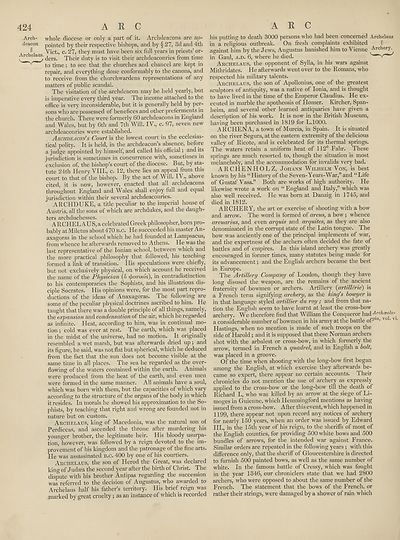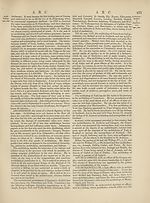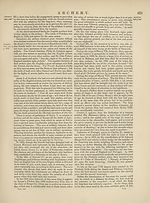Encyclopaedia Britannica > Volume 3, Anatomy-Astronomy
(432) Page 424
Download files
Complete book:
Individual page:
Thumbnail gallery: Grid view | List view

424 ARC
Arch- whole diocese or only a part of it. Archdeacons are ap-
dcacon pointed by their respective bishops, and by § 27, 3d and 4th
\rchelaus ^ct'> c. 27, they must have been six full years in priests’ or-
.rc eaus. ders. rpiie;r duty is to visit their archdeaconries from time
^ to time; to see that the churches and chancel are kept in
repair, and everything done conformably to the canons, and
to receive from the churchwardens representations of any
matters of public scandal.
The visitation of the archdeacon may be held yearly, but
is imperative every third year. The income attached to the
office is very inconsiderable, but it is generally held by per¬
sons who are possessed of benefices and other preferments in
the church. There were formerly 60 archdeacons in England
and Wales, but by 6th and 7th Will. IV., c. 97, seven new
archdeaconries were established.
Archdejcon’s Court is the lowest court in the ecclesias¬
tical polity. It is held, in the archdeacon’s absence, before
a judge appointed by himself, and called his official; and its
jurisdiction is sometimes in concurrence with, sometimes in
exclusion of, the bishop’s court of the diocese. But, by sta¬
tute 24th Henry VIII., c. 12, there lies an appeal from this
court to that of the bishop. By the act of V ill. IV., above
cited, it is now, however, enacted that all archdeacons
throughout England and Wales shall enjoy full and equal
jurisdiction within their several archdeaconries.
ARCHDUKE, a title peculiar to the imperial house of
Austria, all the sons of which are archdukes, and the daugh-
ARCHELAUS, a celebrated Greek philosopher,born pro¬
bably at Miletus about470 b.C. He succeeded his master An¬
axagoras in the school which he had founded at Lampsacus,
from whence he afterwards removed to Athens. He was the
last representative of the Ionian school, between which and
the more practical philosophy that followed, his teaching
formed a link of transition. Ilis speculations were chiefly,
but not exclusively physical, on which account he received
the name of the Physician (6 ^wo-ikos), in contradistinction
to his contemporaries the Sophists, and his illustrious dis¬
ciple Socrates. His opinions were, for the most part repro¬
ductions of the ideas of Anaxagoras. The following are
some of the peculiar physical doctrines ascribed to him. He
taught that there was a double principle of all things, namely,
the expansion and condensation of the air, which he regarded
as infinite. Heat, according to him, was in continual mo¬
tion ; cold was ever at rest. The earth, which was placed
in the midst of the universe, had no motion. It originally
resembled a wet marsh, but was afterwards dried up; and
its figure, he said, was not flat but spherical, which he deduced
from the fact that the sun does not become visible at the
same time in all places. The sea he regarded as the over¬
flowing of the waters contained within the earth. Animals
were produced from the heat of the earth, and even men
were formed in the same manner. All animals have a soul,
which was born with them, but the capacities of which vary
according to the structure of the organs of the body in which
it resides. In morals he showed his approximation to the So¬
phists, by teaching that right and wrong are founded not in
nature but on custom.
Archeraus, king of Macedonia, was the natural son of
Perdiccas, and ascended the throne after murdering his
younger brother, the legitimate heir. His bloody usurpa¬
tion, however, was followed by a reign devoted to the im¬
provement of his kingdom and the patronage of the fine arts.
He was assassinated b.C. 400 by one of his courtiers.
Archelaus, the son of Herod the Great, was declared
king of Judrea the second year after the birth of Christ. The
dispute with his brother Antipas regarding the succession
was referred to the decision of Augustus, who awarded to
Archelaus half his father’s territory. His brief reign was
marked by great cruelty; as an instance of which is recorded
ARC
his putting to death 3000 persons who had been concerned Archelaus
in a religious outbreak. On fresh complaints exhibited 1!
against him by the Jews, Augustus banished him to Vienne Archery,
in Gaul, a.d. 6, where he died.
Archelaus, the opponent of Sylla, in his wars against
Mithridates. He afterwards went over to the Romans, who
respected his military talents.
Archelaus, the son of Apollonius, one of the greatest
sculptors of antiquity, was a native of Ionia, and is thought
to have lived in the time of the Emperor Claudius. He ex¬
ecuted in marble the apotheosis of Homer. Kircher, Span-
heim, and several other learned antiquaries have given a
description of his work. It is now in the British Museum,
having been purchased in 1819 for L.1000.
ARCHENA, a town of Murcia, in Spain. It is situated
on the river Segura, at the eastern extremity of the delicious
valley of Ricote, and is celebrated for its thermal springs.
The waters retain a uniform heat of 112° Fahr. These
springs are much resorted to, though the situation is most
melancholy, and the accommodation for invalids very bad.
ARCHENHOLZ, Johann Wilhelm Von, is best
known by his “History of the Seven-Years-War,” and “Life
of Gustaf Vasa.” Both are works of high authority. He
likewise wrote a work on “ England and Italy,” which was
also well received. He was born at Danzig in 1745, and
died in 1812.
ARCHERY, the art or exercise of shooting with a bow
and arrow. The word is formed of arcus, a bow ; whence
arcuarius, and even arquis and arquites, as they are also
denominated in the corrupt state of the Latin tongue. The
bow was anciently one of the principal implements of war,
and the expertness of the archers often decided the fate of
battles and of empires. In this island archery was greatly
encouraged in former times, many statutes being made for
its advancement; and the English archers became the best
in Europe.
The Artillery Company of London, though they have
long disused the weapon, are the remains of the ancient
fraternity of bowmen or archers. Artillery (artillerie) is
a French term signifying archery, as the king's howyer is
in that language styled artillier du roy ; and from that na¬
tion the English seem to have learnt at least the cross-bow
archery. We therefore find that William the Conqueror had
a considerable number of bowmen in his army at the battle oPia’ vo 'VL
Hastings, when no mention is made of such troops on the
side of Harold; and it is supposed that these Norman archers
shot with the arbalest or cross-bow, in which formerly the
arrow, termed in French a quadrel, and in English a bolt,
was placed in a groove.
Of the time when shooting with the long-bow first began
among the English, at which exercise they afterwards be¬
came so expert, there appear no certain accounts. Their
chronicles do not mention the use of archery as expressly
applied to the cross-bow or the long-bow till the death of
Richard I., who was killed by an arrow at the siege of Li¬
moges in Guienne, which Hemmingford mentions as having
issued from a cross-bow. After this event, which happened in
1199, there appear not upon record any notices of archery
for nearly 150 years, when an order was issued by Edward
III., in the 15th year of his reign, to the sheriffs of most of
the English counties, for providing 500 white bows and 500
bundles of arrows, for the intended war against France.
Similar orders are repeated in the following years ; with this
difference only, that the sheriff of Gloucestershire is directed
to furnish 500 painted bows, as well as the same number of
white. In the famous battle of Cressy, which was fought
in the year 1346, our chroniclers state that we had 2800
archers, who were opposed to about the same number of the
French. The statement that the bows of the French, or
rather their strings, were damaged by a shower of rain which
Arch- whole diocese or only a part of it. Archdeacons are ap-
dcacon pointed by their respective bishops, and by § 27, 3d and 4th
\rchelaus ^ct'> c. 27, they must have been six full years in priests’ or-
.rc eaus. ders. rpiie;r duty is to visit their archdeaconries from time
^ to time; to see that the churches and chancel are kept in
repair, and everything done conformably to the canons, and
to receive from the churchwardens representations of any
matters of public scandal.
The visitation of the archdeacon may be held yearly, but
is imperative every third year. The income attached to the
office is very inconsiderable, but it is generally held by per¬
sons who are possessed of benefices and other preferments in
the church. There were formerly 60 archdeacons in England
and Wales, but by 6th and 7th Will. IV., c. 97, seven new
archdeaconries were established.
Archdejcon’s Court is the lowest court in the ecclesias¬
tical polity. It is held, in the archdeacon’s absence, before
a judge appointed by himself, and called his official; and its
jurisdiction is sometimes in concurrence with, sometimes in
exclusion of, the bishop’s court of the diocese. But, by sta¬
tute 24th Henry VIII., c. 12, there lies an appeal from this
court to that of the bishop. By the act of V ill. IV., above
cited, it is now, however, enacted that all archdeacons
throughout England and Wales shall enjoy full and equal
jurisdiction within their several archdeaconries.
ARCHDUKE, a title peculiar to the imperial house of
Austria, all the sons of which are archdukes, and the daugh-
ARCHELAUS, a celebrated Greek philosopher,born pro¬
bably at Miletus about470 b.C. He succeeded his master An¬
axagoras in the school which he had founded at Lampsacus,
from whence he afterwards removed to Athens. He was the
last representative of the Ionian school, between which and
the more practical philosophy that followed, his teaching
formed a link of transition. Ilis speculations were chiefly,
but not exclusively physical, on which account he received
the name of the Physician (6 ^wo-ikos), in contradistinction
to his contemporaries the Sophists, and his illustrious dis¬
ciple Socrates. His opinions were, for the most part repro¬
ductions of the ideas of Anaxagoras. The following are
some of the peculiar physical doctrines ascribed to him. He
taught that there was a double principle of all things, namely,
the expansion and condensation of the air, which he regarded
as infinite. Heat, according to him, was in continual mo¬
tion ; cold was ever at rest. The earth, which was placed
in the midst of the universe, had no motion. It originally
resembled a wet marsh, but was afterwards dried up; and
its figure, he said, was not flat but spherical, which he deduced
from the fact that the sun does not become visible at the
same time in all places. The sea he regarded as the over¬
flowing of the waters contained within the earth. Animals
were produced from the heat of the earth, and even men
were formed in the same manner. All animals have a soul,
which was born with them, but the capacities of which vary
according to the structure of the organs of the body in which
it resides. In morals he showed his approximation to the So¬
phists, by teaching that right and wrong are founded not in
nature but on custom.
Archeraus, king of Macedonia, was the natural son of
Perdiccas, and ascended the throne after murdering his
younger brother, the legitimate heir. His bloody usurpa¬
tion, however, was followed by a reign devoted to the im¬
provement of his kingdom and the patronage of the fine arts.
He was assassinated b.C. 400 by one of his courtiers.
Archelaus, the son of Herod the Great, was declared
king of Judrea the second year after the birth of Christ. The
dispute with his brother Antipas regarding the succession
was referred to the decision of Augustus, who awarded to
Archelaus half his father’s territory. His brief reign was
marked by great cruelty; as an instance of which is recorded
ARC
his putting to death 3000 persons who had been concerned Archelaus
in a religious outbreak. On fresh complaints exhibited 1!
against him by the Jews, Augustus banished him to Vienne Archery,
in Gaul, a.d. 6, where he died.
Archelaus, the opponent of Sylla, in his wars against
Mithridates. He afterwards went over to the Romans, who
respected his military talents.
Archelaus, the son of Apollonius, one of the greatest
sculptors of antiquity, was a native of Ionia, and is thought
to have lived in the time of the Emperor Claudius. He ex¬
ecuted in marble the apotheosis of Homer. Kircher, Span-
heim, and several other learned antiquaries have given a
description of his work. It is now in the British Museum,
having been purchased in 1819 for L.1000.
ARCHENA, a town of Murcia, in Spain. It is situated
on the river Segura, at the eastern extremity of the delicious
valley of Ricote, and is celebrated for its thermal springs.
The waters retain a uniform heat of 112° Fahr. These
springs are much resorted to, though the situation is most
melancholy, and the accommodation for invalids very bad.
ARCHENHOLZ, Johann Wilhelm Von, is best
known by his “History of the Seven-Years-War,” and “Life
of Gustaf Vasa.” Both are works of high authority. He
likewise wrote a work on “ England and Italy,” which was
also well received. He was born at Danzig in 1745, and
died in 1812.
ARCHERY, the art or exercise of shooting with a bow
and arrow. The word is formed of arcus, a bow ; whence
arcuarius, and even arquis and arquites, as they are also
denominated in the corrupt state of the Latin tongue. The
bow was anciently one of the principal implements of war,
and the expertness of the archers often decided the fate of
battles and of empires. In this island archery was greatly
encouraged in former times, many statutes being made for
its advancement; and the English archers became the best
in Europe.
The Artillery Company of London, though they have
long disused the weapon, are the remains of the ancient
fraternity of bowmen or archers. Artillery (artillerie) is
a French term signifying archery, as the king's howyer is
in that language styled artillier du roy ; and from that na¬
tion the English seem to have learnt at least the cross-bow
archery. We therefore find that William the Conqueror had
a considerable number of bowmen in his army at the battle oPia’ vo 'VL
Hastings, when no mention is made of such troops on the
side of Harold; and it is supposed that these Norman archers
shot with the arbalest or cross-bow, in which formerly the
arrow, termed in French a quadrel, and in English a bolt,
was placed in a groove.
Of the time when shooting with the long-bow first began
among the English, at which exercise they afterwards be¬
came so expert, there appear no certain accounts. Their
chronicles do not mention the use of archery as expressly
applied to the cross-bow or the long-bow till the death of
Richard I., who was killed by an arrow at the siege of Li¬
moges in Guienne, which Hemmingford mentions as having
issued from a cross-bow. After this event, which happened in
1199, there appear not upon record any notices of archery
for nearly 150 years, when an order was issued by Edward
III., in the 15th year of his reign, to the sheriffs of most of
the English counties, for providing 500 white bows and 500
bundles of arrows, for the intended war against France.
Similar orders are repeated in the following years ; with this
difference only, that the sheriff of Gloucestershire is directed
to furnish 500 painted bows, as well as the same number of
white. In the famous battle of Cressy, which was fought
in the year 1346, our chroniclers state that we had 2800
archers, who were opposed to about the same number of the
French. The statement that the bows of the French, or
rather their strings, were damaged by a shower of rain which
Set display mode to:
![]() Universal Viewer |
Universal Viewer | ![]() Mirador |
Large image | Transcription
Mirador |
Large image | Transcription
Images and transcriptions on this page, including medium image downloads, may be used under the Creative Commons Attribution 4.0 International Licence unless otherwise stated. ![]()
| Encyclopaedia Britannica > Encyclopaedia Britannica > Volume 3, Anatomy-Astronomy > (432) Page 424 |
|---|
| Permanent URL | https://digital.nls.uk/193762964 |
|---|
| Attribution and copyright: |
|
|---|---|
| Shelfmark | EB.16 |
|---|---|
| Description | Ten editions of 'Encyclopaedia Britannica', issued from 1768-1903, in 231 volumes. Originally issued in 100 weekly parts (3 volumes) between 1768 and 1771 by publishers: Colin Macfarquhar and Andrew Bell (Edinburgh); editor: William Smellie: engraver: Andrew Bell. Expanded editions in the 19th century featured more volumes and contributions from leading experts in their fields. Managed and published in Edinburgh up to the 9th edition (25 volumes, from 1875-1889); the 10th edition (1902-1903) re-issued the 9th edition, with 11 supplementary volumes. |
|---|---|
| Additional NLS resources: |
|

